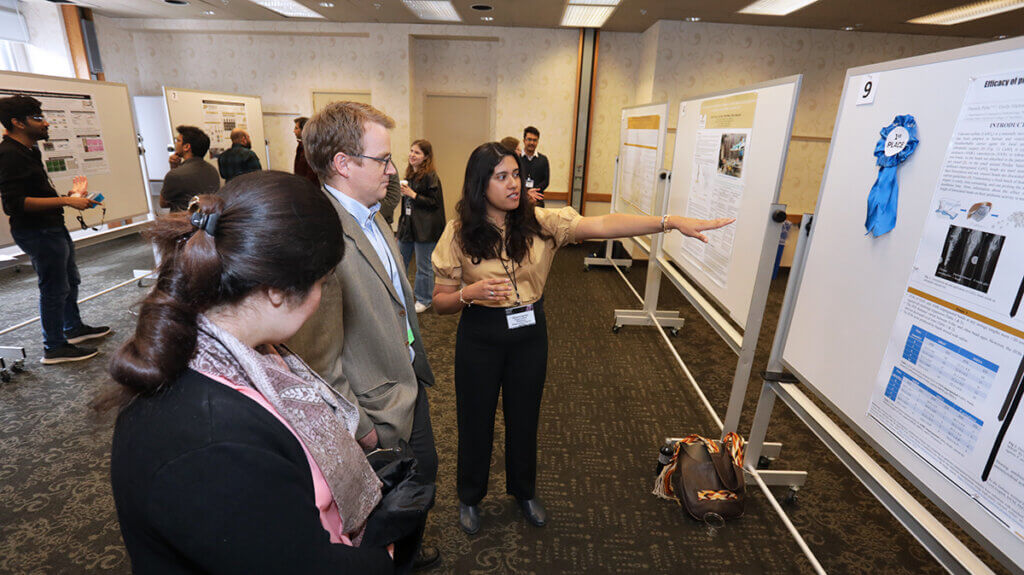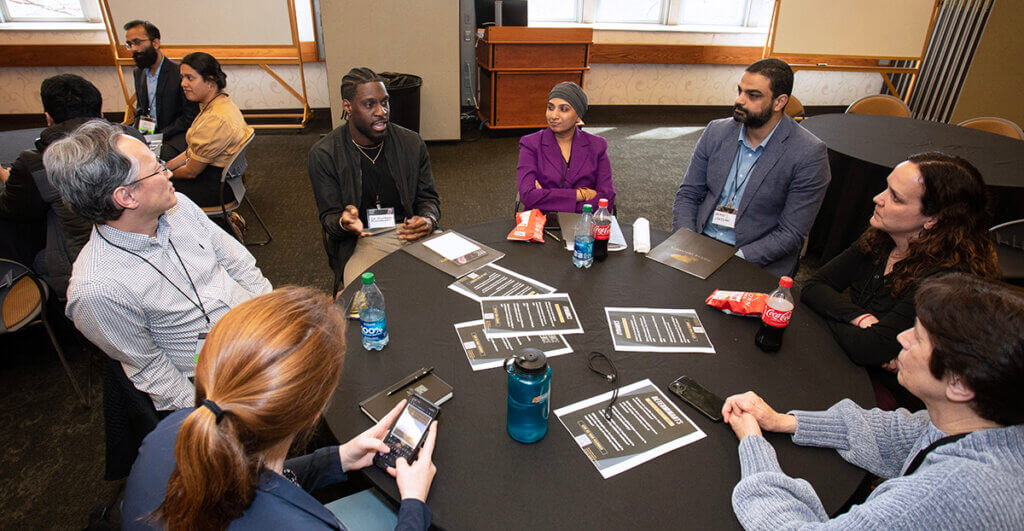
In the face of a foreboding forecast of worsening multi-drug resistant infections (United Nations Foundation, 2021), the Purdue University College of Veterinary Medicine led a multi-disciplinary, campus-wide effort to address the vital topic of Antimicrobial Resistance (AMR) through a free conference held this spring. The inaugural event April 6-7 at the Stewart Center involved multiple Purdue colleges and attracted more than 100 attendees representing eleven states and seven countries. “I am thrilled to welcome you all here this morning to the first ever Antimicrobial Resistance Conference at Purdue University, formally titled Determinants, Dynamics, and Deterrence of Drug Resistance,” said College of Veterinary Medicine Dean Willie Reed as he gave the welcoming remarks at the start of the first session.
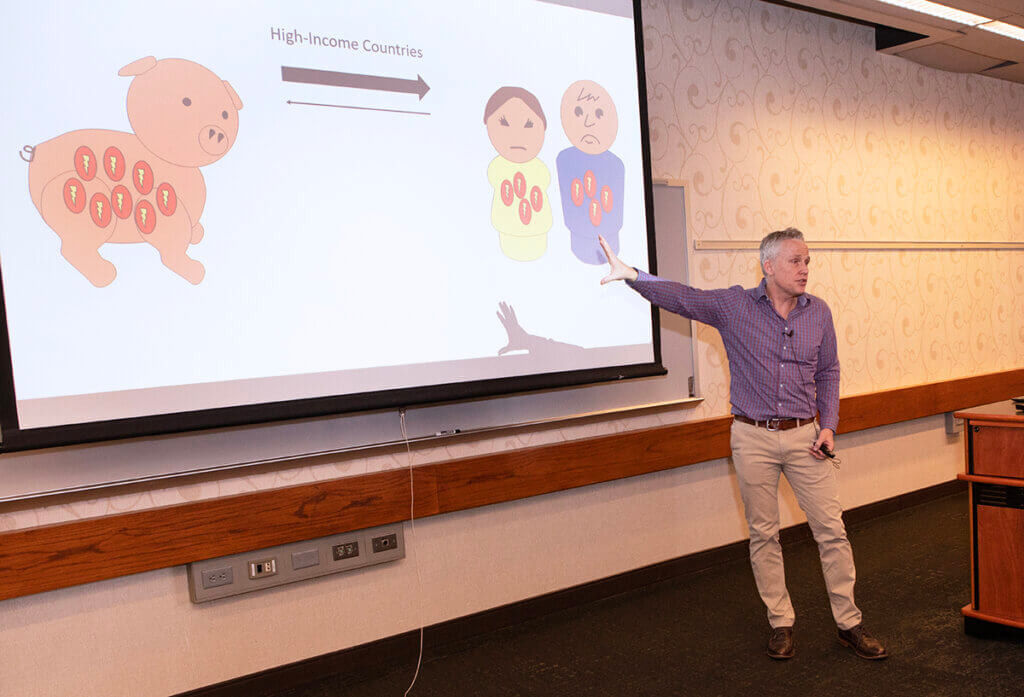
The U.S. Centers for Disease Control and Prevention (CDC) reported in 2019 that more than 2.8 million cases of antibiotic-resistant infections occur annually in the US, resulting in 35,000 deaths. The increased incidence of hypervirulent and multidrug resistant bacterial pathogens has been attributed to the use, overuse, and misuse of antibiotics (FAO, 2016). “Antimicrobial resistance is a complex problem at the intersection of human, animal, and environmental health, or ‘One Health’ as it is called, which can only be addressed through a multidisciplinary approach,” said the leader of the conference organization committee, Dr. Kenitra Hendrix, Purdue clinical associate professor of veterinary diagnostic microbiology and director of the Animal Disease Diagnostic Laboratory. Dr. Hendrix served as principal investigator on a proposal, submitted last year as part of the Purdue 2022 Conference Competition, that resulted in a $25,000 award to fund the conference.
Because of the multidisciplinary emphasis, the conference organizing committee was comprised of faculty from the colleges of Veterinary Medicine, Agriculture, Pharmacy, and Engineering. Dean Reed highlighted the diverse audience of conference attendees during his opening comments. “You, our conference participants, represent private industry, government, and over ten academic institutions,” Dean Reed emphasized. “The conference planning team intentionally designed opportunities for networking and collaboration into the conference agenda. Please take advantage of the poster session and lunch period to learn about the work being done by your colleagues.”
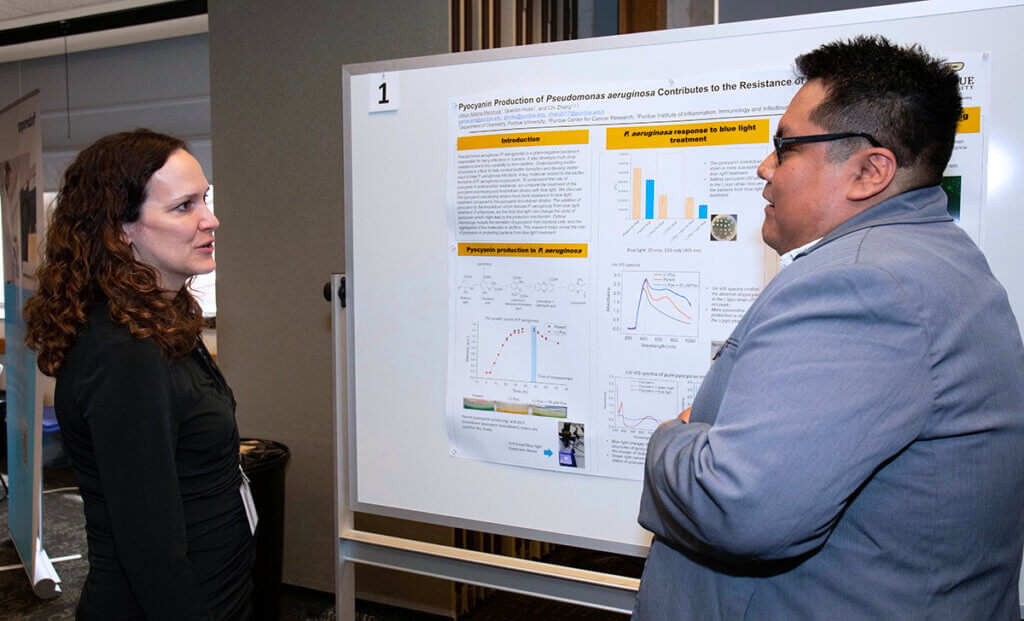
Dr. Hendrix said it was important to bring together attendees who included not only academics, but medical and veterinary practitioners, and individuals working in the areas of public health, food production, food safety, and biotechnology. “The meeting was designed to facilitate networking and collaborations to tackle AMR, with thirteen scientific presentations including three invited keynotes, a poster session, and two roundtable sessions for generation of ideas, collaborations, and action steps,” Dr. Hendrix said.
The conference program was organized around the keynote presentations featuring distinguished scientists in the field. The first theme of “Determinants” focused on the mechanisms of AMR and featured a keynote lecture by Dr. Gerry Wright, Distinguished University Professor in the Department of Biochemistry and Biomedical Sciences at McMaster University in Ontario, Canada, who also serves as executive director of Canada’s Global Nexus for Pandemics and Biological Threats and is a member of the Michael G. DeGroote Institute for Infectious Disease Research. His talk on the topic, “The Natural History of Antibiotic Resistance,” was followed by presentations from Purdue faculty in Medicinal Chemistry and Molecular Pharmacology, Biochemistry, and Agricultural and Biological Engineering.
The second theme, “Dynamics – the Emergence, Rise and Spread of AMR,” was addressed by keynote speaker Dr. Lance Price, a professor at the George Washington University Milken Institute of Public Health in Washington D.C. Dr. Price works at the interface between science and policy to address the growing crisis of antibiotic resistance. His presentation entitled, “Antimicrobial Resistance Through a One Health Lens,” was followed by talks featuring Purdue faculty in Comparative Pathobiology and Animal Sciences.
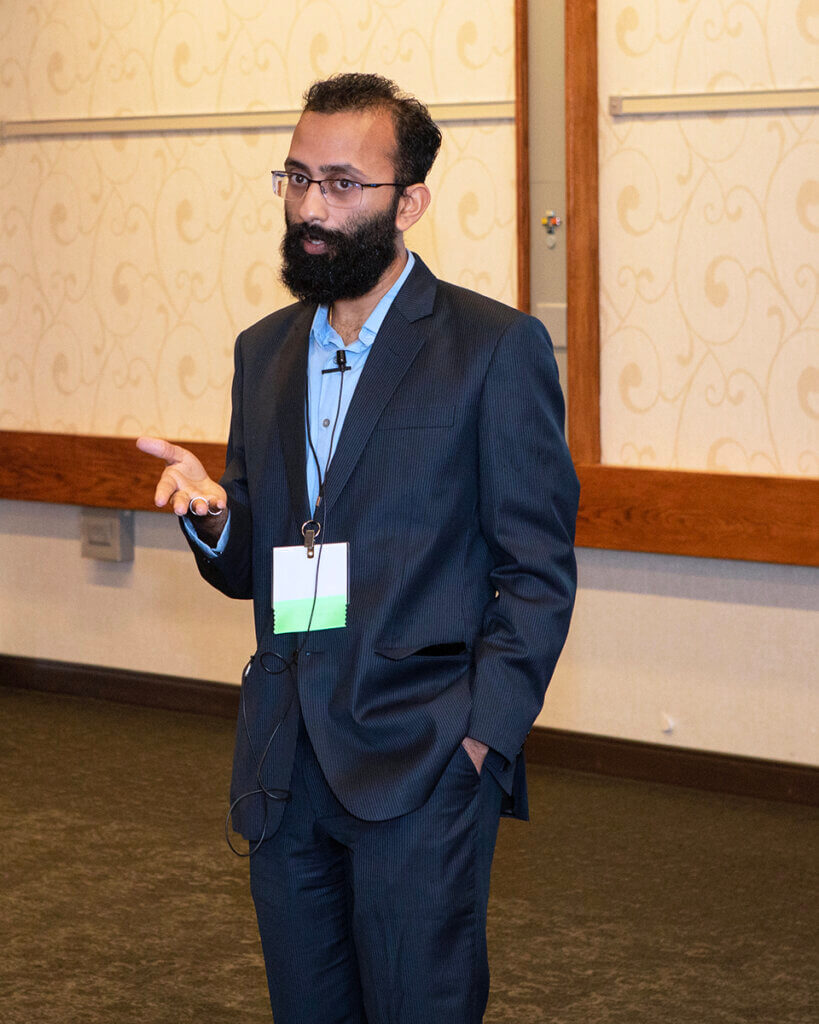
The second day of the conference began with the third theme, “Deterrence – the Control and Mitigation of AMR,” which featured a keynote lecture by Dr. Jennifer Granick, associate professor of internal medicine in the Department of Veterinary Clinical Sciences at the University of Minnesota and a member of the university’s Antimicrobial Resistance and Stewardship Initiative Team. Her talk entitled, “Pulling on the Reins of Antimicrobial Use: the Role of Measurement, Restriction, Education, and Behavioral Change,” was followed by presentations from Purdue faculty in Chemistry, Industrial and Physical Pharmacy, the Weldon School of Biomedical Engineering, and Comparative Pathobiology.
Integral to the success of the conference were roundtable discussions that concluded the program each day and gave participants the opportunity to deliberate about the information shared and its implications. Another feature of the conference was a poster session featuring a competition with prizes offered in two categories. Dr. Daniela Peña Hernandez, a microbiology resident in the Department of Comparative Pathobiology, won the first place prize in the Graduate Student category. The second place prize went to Muhammad Masud Rana, a graduate research assistant in Materials Engineering. The first place prize in the Undergraduate Student category was won by Brooke Tharp, a student in the College of Science. Attendees also were able to visit booths featuring two companies providing information about research laboratory products and molecular testing support, as well as a table with information on the services of the College of Veterinary Medicine’s Animal Disease Diagnostic Laboratory and the Purdue University Veterinary Hospital.
“The conference generated a lot of enthusiasm as scholars representing diverse disciplines, roles, and areas of expertise were able to meet one another and share various points of view and research findings related to antimicrobial resistance,” Dr. Hendrix said. “As a first-time conference of this type at Purdue, the event was a strong start that hopefully will lead to meaningful follow-up steps, including, potentially, another conference next year. Purdue University is well-positioned to lead global efforts to combat antimicrobial resistance. With excellence in animal agriculture, animal disease diagnostics, engineering, veterinary medicine and public health, processing and post-harvest food safety, and pharmacy and drug discovery, global AMR reduction could be Purdue’s next giant leap.”
